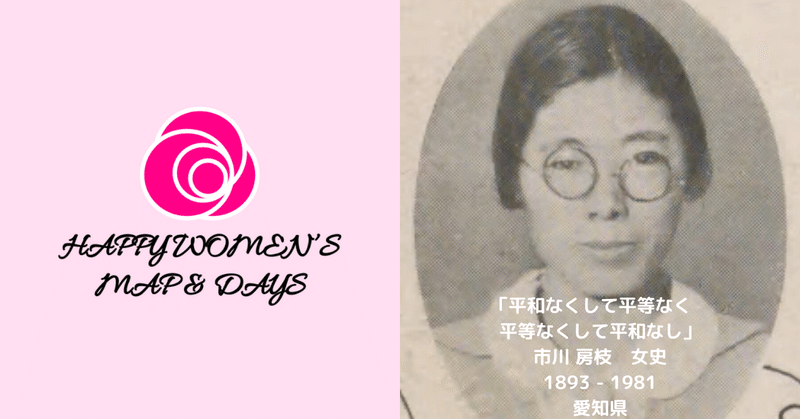
Happy Women's Map 愛知県 婦人参政権運動の主導者・日本女性初の公職追放第一号 市川 房枝 女史

市川 房枝 女史
Ms. Fusae Ichikawa
1893 - 1981
愛知県一宮市中島郡明地村 生誕
Born in Itinomiya-city, Aiti-ken
「平和なくして平等なく 平等なくして平和なし」
"No peace without equality, no equality without peace"
市川房枝女史は日本の婦人参政権運動を主導者です。戦時中に戦争継続のための様々な銃後支援を女性たちに押しつけて公職追放女性第一号となるも、戦後は参議院議員として金権政治の打破、女子差別撤廃条約の早期批准に尽力しました。
Ms. Fusae Ichikawa was a leading figure in Japan's women's suffrage movement. During the wartime, she played a significant role in urging various forms of back-home support from women to sustain the war effort, which led to her becoming the first woman to be banned from public office. However, in the post-war period, she worked as a member of the House of Councillors to dismantle political corruption and strive for the early ratification of the Convention on the Elimination of All Forms of Discrimination Against Women (CEDAW), working towards women's empowerment and gender equality.
*******
房枝は愛知県中島郡明地村に農家の7人きょうだいの3女として生まれます。父親は自分の生業の農業に否定的で子供たちに対して教育熱心。兄は小学校の教師から東京の政治学校の学生さらに米国大学の留学生に、姉は奈良県の女子師範学校生に、妹は名古屋市の淑徳女学校に進学。房枝は勉強嫌いで学校をサボることが多く、アメリカにいる兄を頼って単身渡米を試みたり、家業の農業を手伝います。三輪田高等女学校を受験するも不合格、近所の知人の口利きで女子学院を紹介され受験。矢嶋楫子は面接で「手織りの着物に田舎丸出し」の房枝をほめ入学を許可します。房枝は祈祷会をさぼり、夕方からは国語伝習所に通って万葉集や十八史略などの講義を受けます。地久節に何ら行事を行わない女学院に不満、加えて上京する際に持参した生活資金も少なくなりアメリカの兄からの送金は途絶え、3ヶ月で退学して帰郷。15歳で萩原町立萩原尋常小学校の代用教員として採用、勤務のかたわら準教員講習会を受けて教員に合格すると、岡崎の愛知県第二師範学校に通い、さらに名古屋に新設された愛知県女子師範学校に移ります。新校長の良妻賢母教育に反発して同級生28名とストライキを実施、東京女子高等師範学校を受験するも不合格。朝日尋常高等小学校の訓導として教員生活を始めます。20歳のときに名古屋市第二高等小学校に転任、弟妹と3人で暮らし始めますが、闘病生活の上で退職。就職口を探してあちらこちらの講習会に顔を出しているうちに、哲学会を主宰する組合教会の牧師・金子白夢により洗礼を受けて日曜学校の教師に、また教会の縁をたよりに主筆の小林橘川を訪ねて24歳で名古屋新聞(現中日新聞)の記者になります。1年で退職して上京、兄の恩師である山田嘉吉の開く英語塾に通いはじめ、そこで出会った平塚らいてう、また奥むめをらと共に日本初の婦人団体新婦人協会を設立。女性の集会結社の自由を禁止していた治安警察法第五条の改正を求める運動を展開。房枝が27歳の時にアメリカで婦人参政権が実現すると翌年に渡米、ベビーシッターやハウスワークをしながらアメリカ各地の婦人運動、労働運動を見て回る中で、全米婦人党の指導者のアリス・ポールやキャリー・チャップマン・キャットと面会します。「女は女の問題に専心すべし。いろいろのことを一時にしてはいけない」アドバイスを受けます。帰国後、「婦選獲得同盟」に参加、婦人参政権運動に専念します。戦時中も、婦人に関する研究会を次々に発足して盛り立てていきます。しかしながら房枝は政治的発言権と引き換えに戦争遂行へ協力、「婦選獲得同盟」は「大日本婦人会」へ統合され国民統制組織「大政翼賛会」を中心とした翼賛体制に組み込まれます。房枝は「大日本婦人会」の審議員ならびに「大政翼賛会」調査委員会の紅一点の委員となり、さらに言論統制団体「大日本言論報国会」の紅一点の理事に就任、東条内閣のもとで一党独裁を目指す翼賛選挙運動に参加。「女子挺身隊」「従軍慰安婦」「産業慰安婦」「大陸の花嫁」「傷痍軍人の花嫁」「早婚多産」「優生手術」を奨励、「女性の自由」を批判・弾圧しながら戦争継続のための銃後支援を女性たちに呼びかけます。終戦後、連合国軍(GHQ)総司令官ダグラス・マッカーサー5大改革に「参政権賦与による日本婦人の開放」が盛り込まれ、まず勅令により治安警察法が廃止、女性の結社権が認められ、さらに改正衆議院議員選挙法公布によって女性の国政参加が認められます。房枝は参院選の立候補を前にして、GHQにより軍国主義の廉で日本女性第1号の公職追放を受けます。婦人団体はすぐに追放解除を求める17万の署名を集めます。3年7か月後の追放解除で房枝は57歳でようやく解放され、日本婦人有権者同盟の会長に復帰。「平和なくして平等なく 平等なくして平和なし」を提唱しながら、公娼制度復活反対や売春禁止、再軍備反対などの運動にも取り組みます。1975年の国際婦人年には、全国組織の女性団体に呼びかけ「国際婦人年日本大会」を開催。さらに参議院議員として「金のかからない選挙・政治」を実行。国会において超党派の女性議員を組織して、国連の女子差別撤廃条約(Convention on the Elimination of All Forms of Discrimination Against Women – CEDAW)の日本政府早期批准を求めて活動し続け、 87歳で逝去する2ヵ月前まで、プラカードを持ってデモの先頭に立ります。
"Born as the third daughter of a farming family of seven siblings in Akichi Village, Nakashima District, Aichi Prefecture, Fuso Ichikawa was raised by an education-focused father who disapproved of farming. Her siblings pursued various paths, with her brother becoming a schoolteacher, another studying political science in Tokyo and abroad, her sister attending a women's teacher training school in Nara, and another enrolling in a girls' school in Nagoya. Fuso disliked studying and often skipped school. She attempted to move to America, where her brother was, and helped with farming. She tried to enter Sanwada High School but was unsuccessful, then entered Joshi Gakuin with a recommendation. She was praised by Yajima Kuki for an interview, allowing her admission despite her rustic appearance. Fuso skipped prayer meetings, attended language classes, and studied the Manyoshu and Eighteen Histories in the evenings. Dissatisfied with the lack of events on Respect-for-the-Aged Day at the school, coupled with limited funds when moving to Tokyo and the cessation of money from her American brother, she dropped out after three months and returned home. At 15, she became a substitute teacher at Hagihara Elementary School, attending teacher training while working. She attended Okazaki Aichi Second Normal School and later moved to the newly established Aichi Prefectural Women's Teacher Training School in Nagoya. Disagreeing with the new principal's "good wife, wise mother" education, she led a strike with 28 classmates, unsuccessfully attempted entry to Tokyo Women's Higher Normal School, and began her career as a school disciplinarian at Asahi Elementary School. She later moved to Nagoya Second Elementary School, living with her siblings. Amidst health issues, she resigned and attended various workshops. Baptized by Reverend Kaneko Hakumu of the Union Church, she became a Sunday school teacher and later a journalist for Nagoya Shimbun (now Chunichi Shimbun) at 24 after visiting the editor-in-chief Kobayashi Tachikawa. After a year, she left and joined an English school run by her brother's mentor, Yamada Kayoshi, where she co-founded Japan's first women's association, the New Women's Association. In an era when women's assemblies were restricted by the Peace Preservation Law Article 5, she led movements for its amendment. When women's suffrage was realized in the US when she was 27, she went to America the following year. She worked as a babysitter, engaging in women's and labor movements across the US, meeting leaders of the National Women's Party such as Alice Paul and Carrie Chapman Catt. She returned and joined the Women's Suffrage Alliance, focusing on suffrage. During the war, she established various women's study groups. However, in exchange for political speech rights, she cooperated with the war effort, and the Women's Suffrage Alliance was integrated into the Greater Japan Women's Association, centered around the Imperial Rule Assistance Association. She became a committee member of the Greater Japan Women's Association and a member of the Greater Japan Imperial Rule Assistance Association Investigation Committee. She also became a director of the Greater Japan National Language Patriotic Association for speech control, participating in the Imperial Rule Assistance election movement under the Tojo Cabinet. She encouraged the "Female Volunteer Corps," "Comfort Women," "Industrial Comfort Women," "Brides for the Continent," "Brides for Disabled Soldiers," "Early Marriage and High Birthrate," and "Eugenic Surgery," while suppressing and criticizing "Women's Freedom," all the while rallying women for war support. After the war, General Douglas MacArthur's five major reforms included "liberating Japanese women through suffrage." Security Police Law was abolished through imperial decree, allowing women's association rights, and further revisions to the Lower House Election Law allowed women's political participation. Before running for the Senate election, she was banned by GHQ under suspicion of militarism, becoming the first Japanese woman to face public banishment. Women's groups quickly gathered 170,000 signatures to lift the ban. She was finally released 3 years and 7 months later at the age of 57. She returned as the chairwoman of the Japan Women Voters Association, advocating for "No Peace Without Equality, No Equality Without Peace." She opposed the revival of the licensed prostitution system, supported anti-prostitution, and opposed rearmament. In 1975, during International Women's Year, she organized the "International Women's Year Japan Conference" and continued her activities as a senator, advocating for "low-cost elections and politics." She organized bipartisan female lawmakers in the parliament, tirelessly working to push for early ratification of the United Nations Convention on the Elimination of All Forms of Discrimination Against Women (CEDAW). She continued these activities until two months before her passing at the age of 87, even leading protests with placards."
-市川房枝記念会女性と政治センター Ichikawa Fusae Center for Women and Governance

Share Your Love and Happy Women's Story!
あなたを元気にする女性の逸話をお寄せください!
Share your story of a woman that inspires you!
この記事が気に入ったらサポートをしてみませんか?
